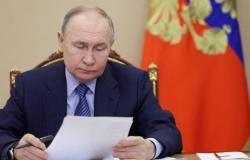There are many of them, they have incredibly deep pockets and they see a major problem that they believe threatens the progress of the Netherlands. And to solve that problem, they are happy to make some of their billions available. Provided, of course, that politicians cooperate a little.
‘They’ here refers to the five largest pension funds in the Netherlands: ABP, PFZW, PME, PMT and BpfBouw. Together they sit on a colossal mountain of money of approximately 900 billion euros. And ‘the problem’ concerns the energy transition. This is not happening nearly as fast as necessary to avert dangerous climate change.
‘
Wednesday was via The Financial Times It is known that these five pension funds have sent a letter to informants Elbert Dijkgraaf (SGP) and Richard van Zwol (CDA) with a proposal to make a significant contribution to the energy transition. NRC also saw that letter. The letter comes at a spicy time. Four right-wing parties are trying to forge a coalition, of which at least the PVV, the largest, has little interest in the energy transition. That party wants to waste as little money as possible on ‘green nonsense’.
Also striking: in recent times, politicians and social organizations have regularly called on pension funds with their enormous savings pots to finance important social tasks. To start with, because the government itself would not be able to pay for everything. In addition to the energy transition, this also involved calls to invest in healthcare, housing and defense. Pension funds seem to be increasingly responding to these calls recently.
In the letter, the pension funds propose that they want to invest several billions of their total managed assets – a specific amount is not mentioned – in the transition. In particular, they want to invest money in infrastructure such as power and heating networks. This infrastructure can be seen as the backbone of the energy transition: without an adequate high-voltage network, for example, there will be no ‘electrification’ of homes and factories.
Wrong on all fronts
At the moment, things are going wrong with that infrastructure on all fronts. The power grid is so full that companies cannot quickly get a new connection anywhere. They often end up on a (long) waiting list. The grid operators therefore say they are working on a ‘historic’ expansion of the power grid. But that costs a lot of money, and also a lot of time. Tennet alone, the state-owned company that manages the national power grid, currently estimates costs of tens of billions of euros for strengthening the network. For the next ten years.
Pension funds see the ‘blockage’ of the grid as the biggest obstacle to the further transition to a cleaner energy supply. Chairman of the Board Eric Uijen of PME, one of the funds involved, says in a telephone statement: “This problem really needs to be solved very quickly. Because otherwise consumers and companies will not always be able to get more power when they need it. The shortages will then have to be distributed and that will hurt. Companies stagnate and may no longer want to invest further, which in turn affects employment. This creates a negative spiral. That is not a good picture of the future.”
Conditions
At the same time, the funds do not simply make their billions available, the letter shows. The pension funds impose a number of conditions. One of these is certainty and stability of policy. If the cabinet decides today to join forces with the pension funds to strengthen the power network, it is not the intention that a next cabinet will throw that policy back into the trash. “We ask the government […] to take and maintain a leading role in providing clear multi-year policy on the energy transition […]”.
The pension funds also want the government to take over some of the financial risks of the investments. Because investments in new and sometimes uncertain (energy) technologies can have a bad outcome. While pension funds have a legal obligation to handle the contributions paid by their participants with care. There are also critical pension participants of the funds themselves, who fear for their benefits, because renewable energy investments do not always yield well. Although, according to the funds, the majority of their supporters are actually pushing for greener investments.
Crucial infrastructure
A spicy issue that the pension funds further highlight is that any investments in the high-voltage grid must find a solution for the current ownership restrictions. It is prohibited by law in the Netherlands for private parties to take an interest in crucial infrastructure. The government, among other things, does not want the ‘fate’ of that infrastructure to be determined by commercial parties. These are “limits” that “limit the pension funds from investing in the Dutch energy transition”.
Pension funds can now invest in those networks in a different way, for example they can simply lend Tennet money – which is what they do, by the way. But given the financial risks associated with those types of investments, the funds only do so to a certain extent. More money could be mobilized if pension funds could take a direct interest in those networks and the government bore part of the risks. Uijen: “We understand very well that power grids must be in the hands of the government. But if you want to make them ‘investable’, you have to come up with something.”
In concrete terms, he sees the following solution. If the pension funds were to collaborate with, for example, a state investment vehicle such as Invest-NL, that vehicle could take ownership and only any returns would flow (partly) to the pension funds. The funds certainly hope for an important role for Invest-NL if their proposal ‘lands’ in The Hague, because this organization would be ideally equipped to keep control of the energy transition.
Money as a solution?
What do the network operators think of the proposal? A spokesperson for the trade association, Netbeheer Nederland, says that extra money has not yet solved the problem of the full power grid, although he calls it “good” that the pension funds are also looking at the energy transition. Money is only “a bottleneck to a limited extent.” “We are also faced with shortages of employees, a shortage of space for construction and time-consuming procedures and permitting.” Those obstacles are not removed.
The pension funds also realize this. Uijen: “These issues also need to be resolved. But there is a real shortage of money, as the government itself has indicated. In any case, we can strengthen that link. And that doesn’t seem unimportant to me.”
He has no concerns about a possible climate-skeptical next cabinet. “Even a new cabinet cannot take its eyes off this problem. It seems to me to be a matter of common sense that we try to prevent households and companies from being kept off the grid in the future.”
To share
Email the editor
Tags: Pension funds making colossal mountain money fuel energy transition
-





